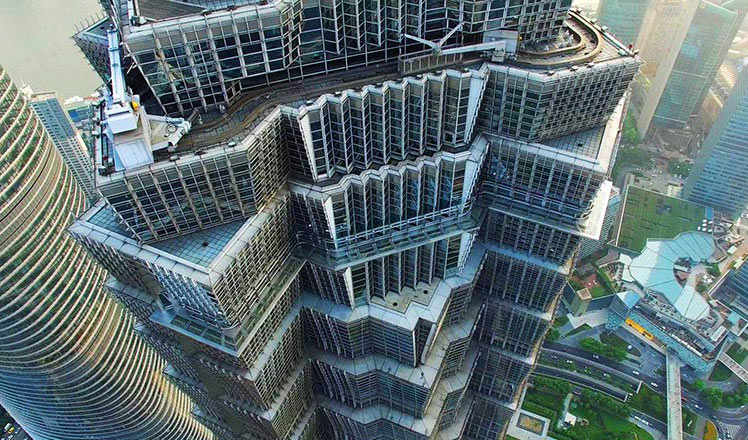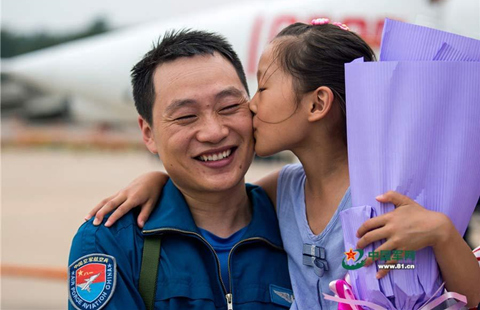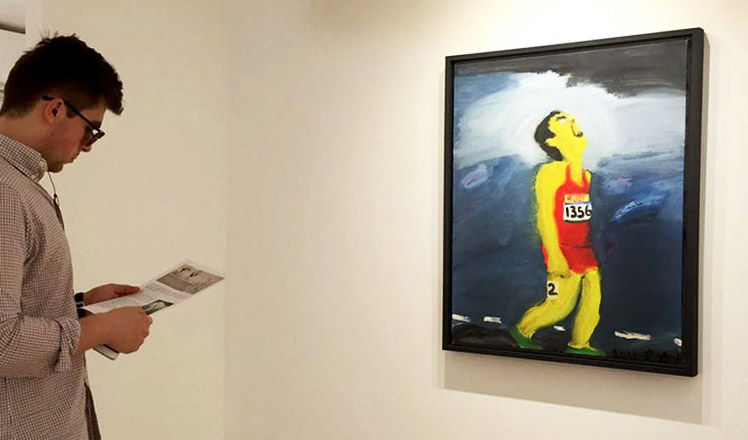Xi brings strength, integrity to Chinese armed forces
Updated: 2016-07-31 08:09
(Xinhua)
|
||||||||
BEIJING - Over three and a half years ago, Xi Jinping, General Secretary of the Communist Party of China (CPC) Central Committee, announced his dream of building a strong army, an idea that has since been the basis of all work concerning military affairs.
From combat capability to strengthened Party leadership and unprecedented reform, Xi, as commander-in-chief of China's armed forces, has directed the path for the People's Liberation Army (PLA) and brought great changes to it as it celebrates its 89th anniversary of founding on August 1.
WHAT ARMY SHOULD BE BUILT?
Xi put forward the dream of a strong army during an inspection tour of Guangzhou's armed forces in early December 2012. It was less than a month after he assumed office as general secretary of the CPC Central Committee, and chairman of the CPC Central Military Commission (CMC).
Xi said achieving a great rejuvenation of the Chinese nation has become China's biggest dream in modern history.
Xi later elaborated on what he meant. At a meeting with national lawmakers from the armed forces on March 11, 2013, Xi said that following the command of the Party, capability to win wars, and having a proper working style, are the fundamentals of building a strong army.
These tenets became the guideline of central authorities' work concerning military affairs and national defense.
On March 23, 2016 when inspecting the National Defense University of the PLA (NDU), Xi said military colleges needed to be strengthened for China to build world-class armed forces.
In a commentary published on May 25, the PLA Daily, flagship newspaper of China's armed forces, said a top army should have world-class equipment, organizational form, combat system, staff quality, strong training level and military theory.
A world-class army has the ability to fight and defeat the world's major powers, it said, and added that only a modernized transformation with new concepts could achieve this end.
In a group study of the Political Bureau of the CPC Central Committee on July 26, 2016, Xi called for building a strong armed force commensurate with China's international status and compatible with national security.
STRENGTHENING COMBAT CAPABILITY
Improving the army's combat strength has become a major focus.
But the modernization level of the Chinese army is inadequate to safeguard national security, and it lags far behind advanced global peers. The Chinese army is not capable enough of waging modern warfare, and officers lack command skills for modern warfare.
Following Xi's requirements, a great discussion and education campaign was held in the PLA and the armed police force in 2014. From the headquarters to the most grassroots squad units, from logistics departments to combat units, from generals to privates, the whole armed forces discussed how to steel themselves and made concrete reforms.
"One of the changes has been to stress real combat drills," said Li Yinxiang, a professor in military strategy in the NDU. Over the past three years, the PLA held hundreds of drills at regiment and brigade level and above, simulating combat environments as realistically as possible.
"In drills, we usually plugged colored banners in all over the exercise fields before, beating drums and sounding gongs. It seemed to be very fierce, but it was not a real combat scenario at all," Li said.
"But now, there are no banners, drums or gongs at all. The environment in exercise fields is like the real environment in combat," Li added.
Thanks to the leadership's efforts and development of equipment, recent years witnessed great progress of the combat strength.
Since 2012 when China's first aircraft carrier "Liaoning" was commissioned, the PLA Navy has gained more and more experience in the utilization of aircraft carrier strength through regular sea training.
On July 6, the heavy-load airfreighter Y-20 was commissioned, a crucial step for the PLA Air Force in improving its strategic power projection capability.
The ongoing large-scale joint drill in north China's Zhurihe training base showed that the PLA is paying more attention to modernized combat.
More army aviation units joined in the drill compared to last year, and the PLA is taking advantage of new combat units such as special warfare, technical and space reconnaissance, electronic countermeasures and others.
STRESSING PARTY LEADERSHIP, INTEGRITY
Xi said that Party leadership was the be-all-and-end-all for building a strong army.
"The key of absolute loyalty to the Party is 'absolute'," Xi said. "It is unique, thorough, unconditional loyalty, without any impurities."
Upon Xi's decision, a conference on the army's political work convened in late October 2014, in Gutian Township, Fujian Province, the very same place that Mao Zedong presided over a conference that established the principle of the Party's absolute leadership over the army in 1929.
A document released after the conference urged the whole armed forces to stick to the fundamental principle of the Party's leadership, and firmly implement the systems and mechanisms that ensure the CMC chairman responsibility system, through which the CPC leads the army.
At the New Gutian conference, Xi urged the army to pay attention to the corruption of Xu Caihou and root out his negative influence.
Xu, who once headed the PLA's political work and was a former CMC vice chairman, was among scores of generals that were charged with corruption after the 18th National Congress of the CPC in late 2012.
Guo Boxiong, another former CMC vice chairman, was also among those charged with corruption.
As Xi ordered, the CMC established an inspection system within the army in October 2013 and the system covered all military area commands in 2015.
The whole army also examined the problems pointed out by Xi at the New Gutian Conference, launching a series of special campaigns to rectify them.
Integrity building achieved significant results. In 2015, almost 10,000 houses were returned and about 25,000 public vehicles were cut. Administration costs above the corps level were cut in half or higher year-on-year.
BIGGEST CHANGE EVER, STILL DEFENSIVE
On April 20, Xi appeared in public with a new title -- commander-in-chief of the newly-established CMC joint battle command center, which he inspected on the day dressed in camouflage fatigues.
The center belongs to a tiered command system including the CMC, theater commands and others. It is part of the overall reform of the PLA's organization, a culmination of Xi's military thought.
Other changes include the inauguration of a general command of the PLA Army, the PLA Rocket Force, and the PLA Strategic Support Force.
The seven military area commands were regrouped into five theater commands, and the four military departments -- staff, politics, logistics and armaments -- were reorganized into 15 agencies.
Professor Li said the new command system responded to the need of a more centralized decision-making processes in modern warfare, while partition of responsibility would lead towards a more modern administration.
"It is the biggest change to PLA structure since the founding of the People's Republic of China in 1949," said Li.
Despite the increase of its strength in both combat capability and command, China's national defense policy, which is defensive in nature, remains unchanged.
Maj. Gen. Chen Zhou, a research fellow with the PLA Academy of Military Sciences, said it is unavoidable that some people are worried about a rising China, but China focuses on a peaceful path to development and building political and military mutual trust, breaking the historical logic of rising powers seeking hegemony.
An increasing number of Chinese servicemen are joining UN peacekeeping missions around the world. In the past two months, three Chinese peacekeeping soldiers were killed in Mali and South Sudan.
"China needs to explain more clearly its core interests and the challenges it is facing," said Li.
"But more importantly, whether we can safeguard our security and maintain global and regional peace depends on our strength," Li said.
- S. Korea to launch WWII 'comfort women' victims foundation
- China to become Australia's biggest tourist source market
- Patient shoots, kills doctor in Berlin then kills himself
- One of church attackers tried to join IS in Syria
- China's coal usage may peak by 2020, experts say
- Bavarian bomber pledged allegiance to Islamic State

 In pictures: Aerial images of Rio's Olympic venues
In pictures: Aerial images of Rio's Olympic venues
 Images reveal distinctive Tunpu culture in Guizhou
Images reveal distinctive Tunpu culture in Guizhou
 Ten photos from around China: July 22 – 28
Ten photos from around China: July 22 – 28
 Welcome back, daddy!
Welcome back, daddy!
 Sweat, hard work and pain: Life of model
Sweat, hard work and pain: Life of model
 Top 10 most profitable companies in the world
Top 10 most profitable companies in the world
 Exhibition showcases Chinese artworks in London
Exhibition showcases Chinese artworks in London
 In pics: Cool ways to beat the heat wave
In pics: Cool ways to beat the heat wave
Most Viewed
Editor's Picks

|

|

|

|

|

|
Today's Top News
Ministry slams US-Korean THAAD deployment
Two police officers shot at protest in Dallas
Abe's blame game reveals his policies failing to get results
Ending wildlife trafficking must be policy priority in Asia
Effects of supply-side reform take time to be seen
Chinese State Councilor Yang Jiechi to meet Kerry
Chinese stocks surge on back of MSCI rumors
Liang avoids jail in shooting death
US Weekly

|

|







